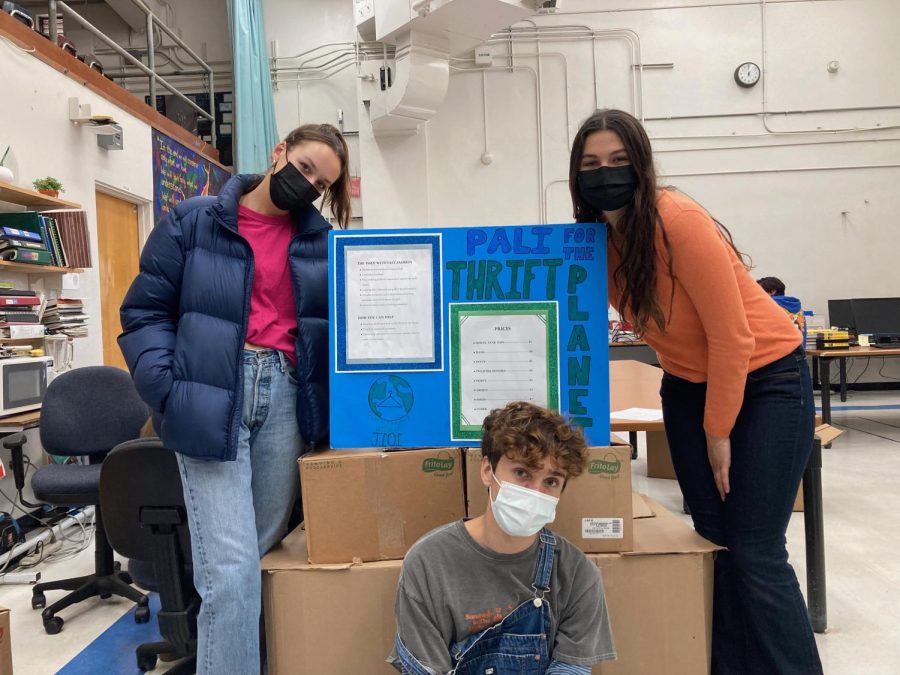EAST Class Empowers Students to Become Leaders
December 9, 2021
Twenty-two Pali students are attempting to make a positive impact on the environment by developing unique projects in the Environmental and Spatial Technology (EAST) class, which is taught by Advanced Placement (AP) Environmental Science teacher Steve Engelmann.
Introduced in 2003, EAST is a community-service-based class with the goal of encouraging students to become future leaders and changemakers.
As an independent class directed by student interests, EAST gives students the opportunity to develop creative initiatives that better their community. EAST is largely run by students, according to Engelmann, who said that “kids figure out what they want to do and I just run around and support them because this class is all about solving problems that they’re interested in.”
Engelmann said that he sees this freedom as a blessing that makes his student’s projects all the more meaningful.
“Students definitely feel personally connected to projects that they’re interested in, which I think makes class more fun for them,” he said.
Engelmann added that he strives to create a balance between independence and collaboration amongst his EAST students. For example, at the beginning of every EAST class, students give updates on current projects to receive feedback from Engelman and peers. As a class, they also discuss current events, a list that includes everything from the recent threat to abortion rights to developments at the United Nations Climate Change Conference. For the remainder of the period, students often come together to collaborate, and class ends with a self assessment of their productivity.
A current EAST project is “Pali Thrift For the Planet,” which encourages students to “reject the normal fast fashion industry and to see the value in buying second-hand clothing or finding alternative ways to shop,” senior and group leader Stella Becir said.
As part of the initiative, students throughout the school are able to donate clothing by dropping their used items off in a bin outside of room J101, where they will then be sorted by Becir and her group mates, Henry Mueller and Sadie Sabin, before they are sold at a clothing stand in the quad during lunch. Profits from the sale are given to the EAST class to fund future projects.
Becir traced the idea for this project back to her AP Environmental Science class, saying that “it really inspired me to help the planet,” as well as to her increased interest in thrifting over the recent months.
Capitalizing on the shift of fashion trends toward vintage clothing, Becir said that “people want clothes that no one else has, because they are tired of seeing the same things on the shelves. It’s really about people developing their own styles.”
According to Becir, “Pali Thrift For the Planet” has become a hit on campus, successfully showing students that “thrifting leads to sustainability and a unique style that you can’t find in department stores.”
Juniors Jameson Rose and Dominic Zuniga are also on a journey toward maintaining environmental health. For their project, Rose and Zuniga take water samples just down the street at Will Rogers State Beach to test for potentially harmful bacteria.
Zuniga said that “our goal is to collect data to inform people on the safeness of the ocean” by contributing to the Blue Water Task Force, an organization that gathers data on the water quality at the beach in order to protect public health, according to their website.
Rose and Zuniga are working with this organization to improve ocean safety, along with encouraging restaurants to become ocean friendly by minimizing their plastic use. Rose said that by working to prevent the spread of contaminated plastic from entering the ocean, he is hopeful that their project will make the ocean safer and cleaner for all.
Additionally, senior Nadia Ghanem organized a fundraiser carnival on Nov. 6 to raise money to support the Cancer Research Institute.
Ghanem’s inspiration for this project is personal.
“My dad passed away three years ago because of cancer,” Ghanem said. “[I] decided to do something like this for him and to support other cancer patients as well as survivors, so that’s a huge deal for me.”
In preparation for the carnival, which was held in the Stadium parking lot, she displayed an array of informational posters about cancer throughout the venue, making the event both an “educational and enjoyable experience,” Ghanem said.
“It was not an easy process,” she said. “I started brainstorming in EAST, and then I had to talk to the dean, the whole school, and it was really stressful to get materials for the carnival.”
Although it was nothing short of an arduous journey, Ghanem said that with the help of her friend Nicole Andres, she successfully raised $400.
EAST has given its students the platform to bring their projects to life outside of the classroom and into the real world, where their original ideas are changing lives and communities.
Engelmann is proud of the flexibility and exploratory class structure he has been able to create as the EAST teacher.
“This class is not about the destination but the journey,” he said. “School usually trains kids that failure is bad, so sometimes they don’t want to try because they don’t think they’ll be successful. But here, I’m trying to encourage them to try because these lessons will stay with them forever.”












